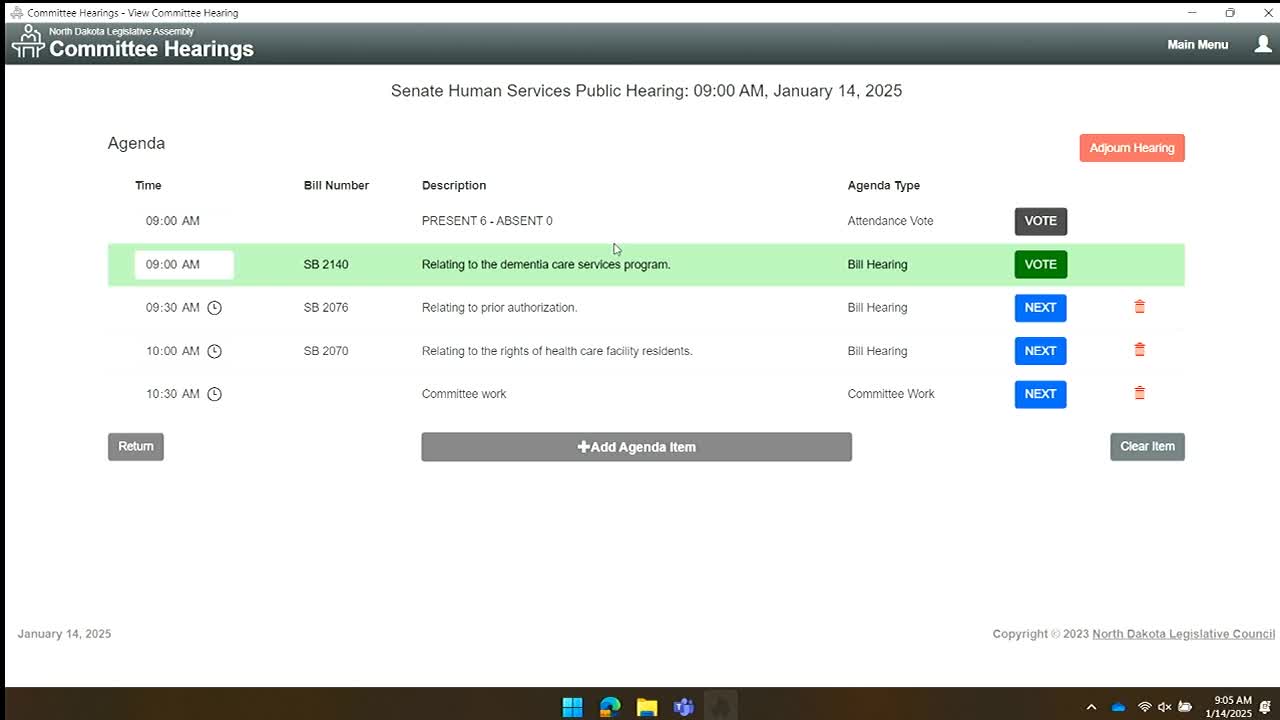Senate Human Services Committee advances bill updating dementia care services program

Summary
The committee heard support testimony and unanimously advanced Senate Bill 2140 to update statutory language that authorizes North Dakota's dementia care services program, with supporters saying the changes align the law with modern diagnostics and care.
The Senate Human Services Committee on Monday advanced Senate Bill 2140, a Department of Health and Human Services-requested update to the state's dementia care services authorizing statute.
Supporters, including the Alzheimer's Association and state adult and aging services staff, told the committee the bill revises definitions and program language that date to 2009 to reflect current diagnostic tools, biomarker testing and the growing understanding that Alzheimer's disease exists on a continuum rather than appearing only in late stages.
Melanie Gaby, North Dakota policy director for the Alzheimer's Association, told the committee the changes are technical and do not alter the program's purpose. "We now have the ability to accurately diagnose Alzheimer's disease through a combination of standard cognitive exams, biomarker testing, and amyloid PET scans," Gaby said. "This understanding is the reason we propose removing the definition of dementia and replacing it with a definition of who our clients are." She said the goal is to bring the statute into alignment with research and ensure services remain available to families and professionals.
Scott Bernstein, executive director of Guardian and Protective Services, described the association's long partnership with the state and said the bill preserves a government-nonprofit model that delivers training and direct consultation to families, memory-care staff and health professionals. Nancy Nicholas Meyer, director of Adult and Aging Services at the Department of Health and Human Services, told the committee the Alzheimer's Association performed an average of 631 care consultations per month in state fiscal year 2023 and delivered professional and public training reaching an average of 107 participants per month. Meyer said the department and the Alzheimer's Association agree the proposed language changes "are positive and align with the current needs for this program" and that no fiscal note accompanies the bill.
Desiree Sorensen, director of the Mountrail-McKenzie Human Service Zone, described how human service zones and qualified service providers rely on dementia training and resources to respond when people with dementia display concerning behaviors in the community. She said timely training for direct care providers and local partners such as law enforcement and EMS is critical.
Committee members asked technical questions about definitions and examples. Senators and witnesses discussed the difference between dementia (an umbrella of symptoms) and specific causes such as Alzheimer's disease, Lewy body dementia or frontotemporal disorders; Gaby, who holds a doctorate and a policy role with the Alzheimer's Association, provided scientific context and examples.
Senator Rohrs moved a "do pass" recommendation; Senator Weston seconded. The committee called the roll: Chair Lee (yes), Senator Weston (yes), Senator Rohrs (yes), Senator Hogan (yes), Senator Van Oosten (yes) and Senator Clements (no). The committee recorded five votes in favor, one opposed; the bill was forwarded from committee with a favorable recommendation. Senator Clements volunteered to carry the bill.
The bill updates statutory language that currently authorizes the dementia care services program and clarifies program clients and services. Supporters emphasized the change is primarily technical: to update definitions and incorporate modern diagnostic and treatment realities while maintaining the existing statewide partnership between the state and the Alzheimer's Association.
No formal opposition testimony was offered at the hearing; the committee record includes additional written testimony in support, including from the Center for Rural Health.
The committee set no further changes on the record; sponsors and witnesses indicated willingness to answer follow-up questions and to provide materials posted with committee documents.
The advance of SB2140 sends the bill to the next step in the legislative process with the committee's endorsement.

